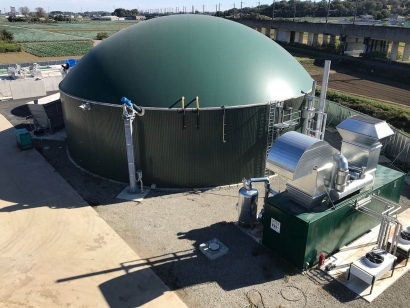
Renewable energies are consistently expanded and already account for a fifth of the power generated in Japan. Above all, leftovers are the preferred substrates in Japan. The biogas plant in Saitama, too, digests some 12,000 t of organic waste into energy. The substrate mix consists of organic waste and cattle manure from a nearby farm that belongs to the operator. The largely liquid organics are introduced to the digester by means of a central pump. Solid feedstocks are transported by a dosing feeder with a capacity of 27 m³.
To ensure efficient digestion of this mixture, Weltec has set up a stainless-steel digester with a capacity of 2,823 m³. Its diameter measures 25.34 m, and its height is 6.3 m. The upstream substrate storage tank, which is made of stainless steel, has a capacity of 336 m³, a diameter of 9.31 m and a height of 5.03 m. The 525-m³ digestate storage tank (diameter 11.64 m, height 5.03 m), too, is made of high-quality stainless steel.
Finally, the digestate is separated and the solid phase is dried with special technology in order to further reduce the volume. Most of this residue is used as compost, and some of it as fertilizer.
"The Japanese appreciate the custom plant design and the benefits of our modular approach, especially because the plant structure with stainless-steel modules facilitates the consideration of the special risks in areas that experience a lot of seismic activity", explains Vladimir Bogatov, who is responsible for sales.
All in all, Weltec has provided the customer with an all-inclusive package in "made in Germany" quality along with individual after-sales service. Subsequently, the Japanese operator also entrusted Weltec with the biological supervision of its other biogas plant, which had been set up by a different provider in 2017. As this plant's yield was above average, the biology experts of Weltec had the substrate mix of the old plant carefully analyzed by a Japanese lab. Based on the results, the raw material mix and the retention time have been optimised. Due to the constantly changing composition of the waste, WELTEC will continue to supervise the two plants biologically in order to maximise the gas yield.
Further information on the energetic utilization and use of all types of organic waste and wastewater will be available from May 30th to June 3rd 2022 at the IFAT in Munich (Germany), hall A4, stand 217.

